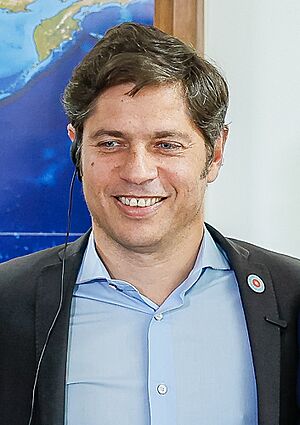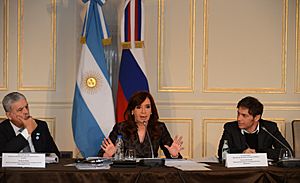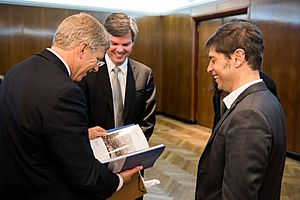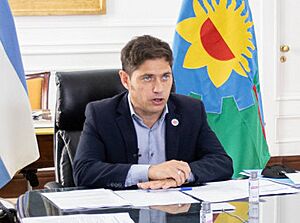Axel Kicillof facts for kids
Quick facts for kids
Axel Kicillof
|
|
|---|---|

Kicillof in 2024
|
|
| Governor of Buenos Aires | |
| Assumed office 10 December 2019 |
|
| Vice Governor | Verónica Magario |
| Preceded by | María Eugenia Vidal |
| National Deputy | |
| In office 10 December 2015 – 10 December 2019 |
|
| Constituency | City of Buenos Aires |
| Minister of Economy and Public Finances | |
| In office 18 November 2013 – 10 December 2015 |
|
| President | Cristina Fernández de Kirchner |
| Preceded by | Hernán Lorenzino |
| Succeeded by | Alfonso Prat-Gay |
| Personal details | |
| Born | 25 September 1971 Buenos Aires, Argentina |
| Political party | Justicialist Party (since 2021) |
| Other political affiliations |
Front for Victory (2011–2017) Citizen's Unity (2017–2019) Frente de Todos (2019–2023) Union for the Homeland (2023–present) |
| Spouse | Soledad Quereilhac |
| Alma mater | University of Buenos Aires |
| Signature |  |
Axel Kicillof (born 25 September 1971) is an Argentine economist and politician. He has been the Governor of Buenos Aires Province since 2019. Before that, he was Argentina's Minister of Economy from 2013 to 2015. He worked under the presidency of Cristina Fernández de Kirchner.
Kicillof is known for his strong belief in Keynesian economics. This is an economic idea that governments should spend money to help the economy grow. He was a big supporter of the Kirchners since his time as a student. He was part of a youth group called La Cámpora. He also taught Economic Sciences at the University of Buenos Aires. He is known for his unique style, which shows his anti-establishment views.
Contents
Early Life and Education
Axel Kicillof was born in Buenos Aires, Argentina. He is the second of three children. His parents were a psychologist and a psychoanalyst. He grew up in the Recoleta neighborhood.
From 1984 to 1989, Kicillof went to the Colegio Nacional de Buenos Aires. He then studied at the University of Buenos Aires (UBA) from 1990 to 1995. He graduated with high honors in Economics. He was the best student in his class. He continued his studies at UBA from 1997 to 2005, earning a Doctorate in Economics. His main project for his doctorate was about the ideas of economist Lord Keynes.
At university, Kicillof was an important student leader. He led a student group called Tontos pero No Tanto (TNT). He was also a member of the Kirchnerist youth group La Cámpora. Students admired him like a "rock star." He often spoke out against certain economic policies in Argentina during his student years.
Career in Academia and Government
Teaching and Research Work
Kicillof was a professor at the University of Buenos Aires from 1998 to 2010. He was known for his writings on economic ideas. He also taught economics at other universities. These included the Universidad Nacional de Quilmes and the Universidad Nacional de General Sarmiento.
He taught advanced courses in economics for master's and doctoral programs. He also worked as a researcher for CONICET. This is a national research council in Argentina. He was also a deputy director at a research center at the University of Buenos Aires.
Other Professional Roles
Before joining the government, Kicillof worked in different advisory roles. He advised various companies and organizations. He was also a financial manager for a medical center. He worked as an economist for the Inter-American Center for Macroeconomic Studies.
Later, he became the CFO for Aerolíneas Argentinas. This is Argentina's national airline. He helped create their business plan. In 2011, he became the deputy general manager of Aerolíneas Argentinas. He also joined the board of directors of Siderar, a steel company.
Time as Finance Minister
When Cristina Fernández de Kirchner started her second term as president of Argentina, Kicillof was appointed as Secretary for Economic Policy. This meant he was a high-ranking official in the Ministry of Economy. On 18 November 2013, he officially became the Minister of Economy.
Renationalizing YPF
Kicillof played a key role in the renationalization of YPF. YPF is a large Argentine oil company. In 2012, the government took back control of YPF from the Spanish company Repsol. This was a very big step in Argentina's history. Kicillof believed this action was needed to change Argentina's economic policies from the 1990s. He became a director at YPF SA in June 2012. He was seen as the main thinker behind this move.
In 2012, Kicillof told the Argentine Congress that Argentina would not pay the $10 billion Repsol demanded. Eventually, an agreement was reached in November 2013. Repsol received about US$5 billion in bonds for its share in YPF.
Leading the Economy

As Minister of Economy, Kicillof had a lot of influence. He was very close to President Cristina Kirchner and her son Máximo. The New York Times described him as a "mercurial" scholar who was leading a big change in Argentina's economic policies. Argentina was trying to get back into global financial markets after a debt crisis in 2002.
Kicillof wanted the government to have more control over Argentina's economy. This was happening at a time when economic growth was slowing down and prices were rising. When Argentina's currency, the peso, lost value in 2014, Kicillof blamed speculation and "vulture funds" from the United States. He became one of the most powerful officials in the government. He believed Argentina was not in default, even though some international agencies said it was.
Dealing with Debt Issues
Kicillof was a central figure in a big dispute in 2014. This was with a group of bondholders who had not agreed to Argentina's debt restructuring plan. These were called "holdout bondholders." One group, NML Capital, demanded a large sum for bonds they bought cheaply. Most bondholders (over 92%) had accepted Argentina's plan and were being paid.
A U.S. court ruling in 2014 stopped payments to the bondholders who had agreed to the restructuring. This was to force Argentina to pay the holdouts. Kicillof refused to meet directly with the holdout creditors. He argued that paying them would encourage other "vulture funds" to cause problems for Argentina in the future. He spoke at the United Nations against the U.S. court's decision.
Kicillof led a team to negotiate with a mediator in New York. He insisted that Argentina would only talk to the mediator, not the creditors directly. He also convinced President Kirchner not to accept a deal proposed by private bankers. He called it a "scam." At the G-20 Summit in Australia in 2014, Kicillof asked countries to take action against "vulture funds." His efforts helped lead to a statement from the G-20 about managing sovereign debt in an orderly way.
Serving as a Congressman
Before the 2015 general election, Kicillof ran for a seat in the Argentine Chamber of Deputies. He was the top candidate for the Front for Victory party in City of Buenos Aires. He won enough votes to be elected.
As a national deputy, Kicillof worked on several important committees. These included committees on finance, budgets, and industry. He also led the commission on economic affairs. He proposed bills to make access to water, gas, and electricity a human right. He also worked on bills to promote formal employment and gender equality.
Governor of Buenos Aires Province
After Cristina Fernández de Kirchner's presidency ended, Kicillof started a campaign across Buenos Aires Province. This is the largest province in Argentina. He traveled in an old car, meeting people and local activists in all 135 areas of the province.
For the 2019 provincial elections, Kicillof was chosen as the candidate for governor by the new Frente de Todos coalition. His running mate was Verónica Magario. Kicillof continued his travels, focusing his campaign on criticizing the current governor. On election day, Kicillof and Magario won with 52.15% of the votes. He became governor on 11 December 2019.
Kicillof and Magario were re-elected for a second term on 22 October 2023. They won with 44.8% of the vote. This victory was seen as a big help for their party's presidential candidate in the national elections that year. He was sworn in for his second term on 11 December 2023.
Personal Life
Axel Kicillof is married to Soledad Quereilhac. She is a literature professor at the University of Buenos Aires. She also wrote a book called The Scientific Imagination: occult sciences and fantasy literature in turn-of-the-century Buenos Aires (1875-1910). They live in Buenos Aires and have two children. Kicillof speaks English and French very well. His younger sister, Irene, is a psychologist. His older brother, Nicolás, is a software engineer.
Kicillof has been described as being very close to Cristina Fernández de Kirchner. He supported giving women the right to decide about their bodies.
Images for kids
See also
 In Spanish: Axel Kicillof para niños
In Spanish: Axel Kicillof para niños




